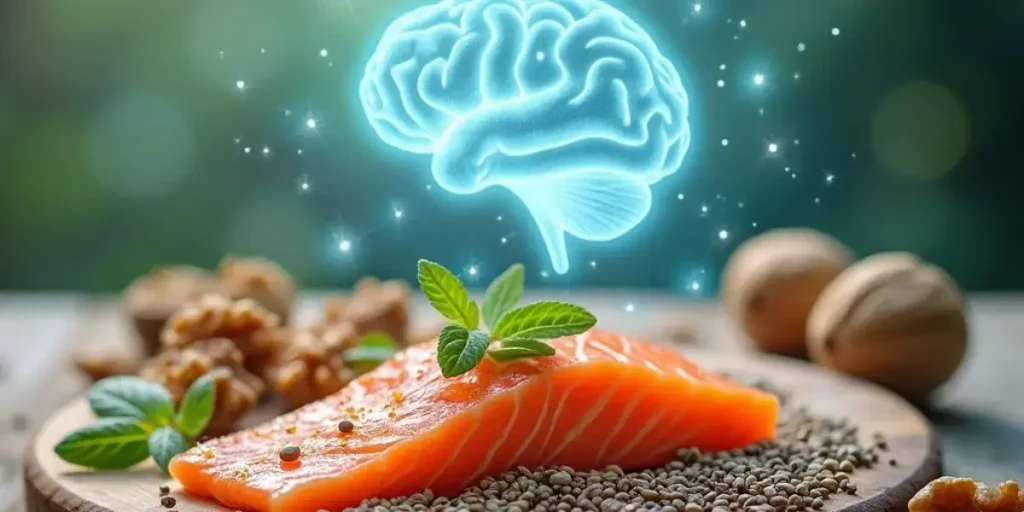In today’s fast-paced world, mental wellness is more important than ever. Omega-3 fatty acids have emerged as a powerful natural solution for supporting emotional well-being, improving mood, and addressing mental health challenges. From reducing symptoms of depression and anxiety to combating brain fog and mood disorders, Omega-3s play a vital role in enhancing brain function and overall mental health. In this article, we’ll explore how Omega-3 for depression and anxiety, mood disorders, and emotional well-being can transform your mental wellness journey.

Quick Links
What You'll Find in This Guide
What Are Omega-3 Fatty Acids?
Omega-3 fatty acids are essential polyunsaturated fats vital for maintaining good health. The three main types of omega-3s that are especially beneficial for mental well-being include ALA (alpha-linolenic acid), EPA (eicosapentaenoic acid), and DHA (docosahexaenoic acid). These types are found in various food sources and support crucial functions within the brain, impacting mood regulation and cognitive performance. ALA is found in plant-based sources like flaxseeds and walnuts, while EPA and DHA are more common in fish and seafood. All three types of omega-3s contribute to reducing inflammation in the brain, which is key to improving mood and cognitive function.
The Science of Omega-3s and Their Effect on Mood
Recent studies have shown that omega-3 fatty acids play an essential role in the functioning of neurotransmitters, which are the brain chemicals responsible for regulating mood. Specifically, omega-3s help maintain the fluidity of cell membranes in the brain, which enhances communication between neurons and supports the production of serotonin and dopamine—two key neurotransmitters linked to mood regulation.
Inadequate levels of omega-3s have been linked to increased levels of anxiety and depression. For instance, research suggests that individuals with low levels of omega-3s are more likely to experience mood disorders, while those who consume omega-3-rich foods may experience relief from symptoms. By providing the brain with the necessary building blocks to function optimally, omega-3s promote mental clarity, emotional balance, and overall well-being.
Omega-3 for depression and anxiety
Omega-3s and Depression
Depression is one of the most prevalent mental health issues in the world, and omega-3s have shown promising results in alleviating its symptoms. Several studies indicate that individuals who consume higher levels of omega-3 fatty acids tend to have a lower risk of developing depression, and omega-3 supplementation is effective in reducing depressive symptoms.
One study, published in the American Journal of Clinical Nutrition, found that individuals who supplemented with omega-3s experienced improved mood and a decrease in depressive symptoms compared to those who did not take omega-3 supplements. This is largely due to the anti-inflammatory properties of omega-3s, which help regulate the inflammatory responses often associated with depression.
Omega-3s and Anxiety
Anxiety disorders are another common mental health issue that affects millions of people. Omega-3 fatty acids, particularly EPA, are believed to have calming effects on the nervous system. Research suggests that omega-3s may help reduce the body’s production of cortisol, a hormone released in response to stress, thus lowering anxiety levels. Some studies have even shown that omega-3 supplementation can significantly reduce symptoms of generalized anxiety disorder (GAD), social anxiety, and post-traumatic stress disorder (PTSD).

Top Foods Rich in Omega-3 for Depression and Anxiety
Incorporating omega-3-rich foods into your diet is one of the best ways to enhance mental well-being. Below are some of the top omega-3 food sources:
- Fatty Fish: Fish like salmon, mackerel, sardines, and tuna are rich in EPA and DHA, which are the most bioavailable forms of omega-3. Incorporating fatty fish into your meals two to three times a week is recommended to boost your omega-3 intake.
- Flaxseeds: These small seeds are packed with ALA, a plant-based omega-3. You can add flaxseeds to smoothies, oatmeal, or baked goods for a nutritional boost.
- Chia Seeds: Another excellent source of ALA, chia seeds can be sprinkled on yogurt, blended into smoothies, or used to make chia pudding.
- Walnuts: Rich in ALA, walnuts are a perfect snack or addition to salads and baked goods. They provide a good source of plant-based omega-3s.
- Hemp Seeds: These seeds contain a healthy balance of omega-3s and omega-6s, supporting overall health and mood stabilization.
- Algal Oil: Algal oil provides a direct source of DHA and EPA for those who follow a plant-based diet. It’s available in supplement form and can be a great option for vegans and vegetarians.
Inflammation and Mood Disorders: The Omega-3 Solution
Chronic inflammation is believed to play a significant role in the development of mood disorders, including anxiety and depression.Omega-3 fatty acids are well-known for their strong ability to reduce inflammation, which plays a crucial role in supporting mental and physical health. By reducing inflammation in the brain, omega-3s can help improve neurotransmitter function, balance hormones, and stabilize mood.
When the brain experiences inflammation, it can interfere with serotonin production, which may lead to symptoms of depression and anxiety. Omega-3 fatty acids, particularly EPA, work to decrease inflammatory markers in the body, helping to create a more stable mental state.
Best Way to Incorporate Omega-3s into Your Diet
Here are some simple ways to increase omega-3 intake and support better mood management:
- Start Your Day with Omega-3s: Add flaxseed or chia seeds to your morning smoothie or oatmeal for a nutritious breakfast that supports mental clarity throughout the day.
- Snack on Walnuts: Keep a small handful of walnuts at your desk or in your bag for a quick snack that helps stabilize blood sugar levels and boost mood.
- Switch to Fatty Fish: Replace red meat with fatty fish like salmon or mackerel a few times per week. Not only will you benefit from the omega-3s, but you’ll also enjoy a rich source of protein and vitamins.
- Try Omega-3 Supplements: If you find it difficult to get enough omega-3s from food sources, consider omega-3 supplements made from fish oil or algae oil.

Side Effects of Taking Too Much Omega-3
While omega-3 fatty acids are essential for health, it’s important to consume them in moderation. Overconsumption can lead to side effects such as excessive bleeding, digestive issues, or a weakened immune system. It’s recommended to aim for around 250-500 mg of EPA and DHA per day, depending on individual health needs. Always consult a healthcare provider before taking omega-3 supplements to ensure proper dosage.
What are the major side effects of omega-3?
The major side effects of omega-3 include:
Fishy aftertaste or burps
Upset stomach or diarrhea
Increased bleeding risk (in high doses)
Low blood pressure
Blood sugar fluctuations (in diabetics)
Allergic reactions (especially for those with fish allergies)
If you have any health concerns, consult a doctor before taking omega-3 supplements.
What happens if you have too much omega-3?
Consuming too much omega-3 can lead to:
Increased bleeding risk (easy bruising, nosebleeds)
Low blood pressure (dizziness, fatigue)
Blood sugar spikes (especially in diabetics)
Digestive issues (diarrhea, bloating)
Weakened immune function (higher infection risk)
Vitamin A toxicity (from fish liver oils)
High doses should be taken with caution and under medical supervision.
Who should not take omega-3
You should avoid or consult a doctor before taking omega-3 if you:
Have a bleeding disorder (it can increase bleeding risk).
Take blood thinners (e.g., Warfarin, Aspirin).
Have low blood pressure (it may lower it further).
Are allergic to fish or shellfish (risk of allergic reactions).
Have diabetes (may affect blood sugar levels).
Are scheduled for surgery (stop omega-3 at least 2 weeks before).
What is the most effective way to take omega-3
The most effective way to take omega-3 is:
With meals – Especially meals containing fat to enhance absorption.
Choose high-quality supplements – Look for EPA & DHA-rich fish oil or krill oil with third-party testing.
Follow the right dosage – Typically 250–500 mg of EPA/DHA per day (or as advised by a doctor).
Consistent timing – Take it at the same time daily for better results.
Refrigerate capsules – Helps prevent oxidation and fishy aftertaste.
For best results, pair supplements with a healthy diet rich in omega-3 foods like salmon, walnuts, and flaxseeds.
Do omega-3s reduce inflammation?
Yes, omega-3s reduce inflammation by:
Lowering inflammatory markers like C-reactive protein (CRP).
Decreasing production of pro-inflammatory molecules (e.g., cytokines).
Helping manage chronic inflammatory conditions like arthritis, heart disease, and autoimmune disorders.
Regular intake of EPA and DHA (from fish oil) is most effective for reducing inflammation.
What food has the most omega-3?
Foods highest in omega-3 include:
Animal Sources (Rich in EPA & DHA)
Mackerel – 4,580 mg per serving (100g)
Salmon – 2,150 mg per serving (100g)
Sardines – 1,480 mg per serving (100g)
Anchovies – 2,113 mg per serving (100g)
Herring – 2,366 mg per serving (100g)
Plant Sources (Rich in ALA)
Chia seeds – 5,060 mg per ounce (28g)
Flaxseeds – 6,388 mg per tablespoon (ground)
Walnuts – 2,570 mg per ounce (28g)
Hemp seeds – 2,600 mg per tablespoon
For the most benefits, prioritize fatty fish for direct EPA & DHA intake.
What fruit is very high in omega-3?
Fruits generally have low omega-3 content, but some contain small amounts of ALA (alpha-linolenic acid), a plant-based omega-3. The best options include:
Avocados – Contain healthy fats, including some omega-3.
Blackberries – Have small amounts of ALA.
Raspberries – Provide minor omega-3 content.
Mangoes – contain trace amounts.
For a higher omega-3 intake, focus on nuts, seeds, and fatty fish rather than fruits.
What are the symptoms of lack of omega-3?
A lack of omega-3 can lead to various symptoms, including:
Dry skin and hair
Joint pain or stiffness
Fatigue and low energy
Depression or mood swings
Memory issues or difficulty concentrating
Poor circulation (cold hands and feet)
Weak immune system (frequent infections)
Eye problems (dry eyes or blurry vision)
How does omega-3 affect mood
Omega-3s, particularly EPA and DHA, have a positive impact on mood by:
Reducing inflammation in the brain, may help alleviate symptoms of depression and anxiety.
Enhancing neurotransmitter function, improving communication between brain cells, and boosting serotonin (the “feel-good” chemical).
Regulating stress hormones and promoting a calmer mood.
Supporting brain health and cognitive function can help improve overall emotional well-being.
What does omega-3 do to hormones?
Omega-3s can influence hormone levels and function in several ways:
Regulate inflammation – Omega-3s reduce inflammation, which can help balance hormones, especially those related to stress (like cortisol).
Improve insulin sensitivity – Omega-3s can enhance the body’s response to insulin, helping with blood sugar regulation.
Support reproductive hormones – Omega-3s may help balance estrogen and progesterone in women, supporting menstrual and reproductive health.
Modulate thyroid function – Omega-3s can help improve thyroid hormone production, which affects metabolism.
Balance cortisol levels – Omega-3s help lower stress hormone cortisol, reducing the negative effects of chronic stress.
Incorporating omega-3-rich foods into your diet can make a significant difference in managing anxiety and improving overall mental health. Foods such as fatty fish, walnuts, and flaxseeds are rich in omega-3s, which support brain function and mood regulation. By adding these foods to your meals, you can help reduce anxiety symptoms, enhance emotional stability, and boost cognitive health.
To learn more about how food choices can impact mental health, check out this article on foods to reduce anxiety: A diet for a calmer mind.
Don’t miss out—follow us on social media for updates:









